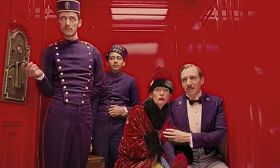 I’m admittedly (and shamefully) a latecomer to the genius of animator/director Hayao Miyazaki, whose recent masterpiece The Wind Rises was the first of his impressive 35-year career that I’ve actually seen, but may turn out to be the last the master makes, if Miyazaki follows through with his promise to retire. The Wind Rises was an absolute revelation, its hand-drawn artistry, lavish palettes and poetic resonance reminding me what an art form narrative cinema can still be in the hands of a true master. I kick myself that it took me so long to discover his work and I’ve made a promise to myself to go back and watch his previous films and make up for this gaping hole in my cinema education.
I’m admittedly (and shamefully) a latecomer to the genius of animator/director Hayao Miyazaki, whose recent masterpiece The Wind Rises was the first of his impressive 35-year career that I’ve actually seen, but may turn out to be the last the master makes, if Miyazaki follows through with his promise to retire. The Wind Rises was an absolute revelation, its hand-drawn artistry, lavish palettes and poetic resonance reminding me what an art form narrative cinema can still be in the hands of a true master. I kick myself that it took me so long to discover his work and I’ve made a promise to myself to go back and watch his previous films and make up for this gaping hole in my cinema education.
In an interesting twist—coincidence?—I find myself at the same time re-evaluating another director who I realize I may have written off too soon. It could be a great many things coming into play, maybe I’m older and I “get” them more, maybe he’s finding a clearer voice, or, maybe, he’s just making better movies, but I have to say that I am now, finally, coming around on Wes Anderson movies. I hated Rushmore and The Royal Tenenbaums when they came out 15 and 13 years ago, respectively. But now? I loved Anderson’s last movie, Moonrise Kingdom, and his current film, The Grand Budapest Hotel is, in my opinion, the best one yet.
Much like Moonrise Kingdom, The Grand Budapest Hotel is a cinematic pop-up book—a whimsical, fantastical fable that takes the audience into a world all its own. This time, it’s an elegant Eastern European hotel in the late ‘30s, run by its charming and precise concierge, M. Gustave (Ralph Fiennes), as seen through the eyes of its earnest Lobby Boy (Tony Revolori). There are adventures galore and Fiennes is in form we haven’t seen in years, a nice reminder of his tremendous talent—boy, he’s still got it in spades. Revolori is a nice sidekick, but, as usual in any Anderson movie, it’s the ensemble that steals the show, from the regulars (Adrian Brody, Jeff Goldblum, Willem Dafoe, Tilda Swinton, Edward Norton, Jason Schwartzman, Bill Murray), to the first-timers (Saoirse Ronan, F. Murray Abraham, Jude Law), all are first-rate. Wes Anderson is more than a writer/director, he’s a genuine artist, with a style and voice all his own and he knows it. He’s comfortable with/in it, he’s able to play with it, and it works because he surrounds himself with actors who buy into it and commit just as much to it as he does. Anderson is in very rarefied air in Hollywood—much like the Coen Brothers—an artist who can make his own movie, with his own vision and voice, seemingly concerned more with artistic integrity than financial results, which must be why so many actors want to work with him again and again. It doesn’t hurt that it seems like his actors are always having a blast.
Besides the performances, what works the most about Anderson’s films now are the worlds he creates. It worked in Moonrise Kingdom and it works again here in The Grand Budapest Hotel. He paints a picture on a canvas and you are drawn in, from corner to corner, as with a paintbrush, cheeky at moments, violently at others, but always warmly, colorfully and completely engagingly. Every moment is staged for the benefit of the camera frame, and this becomes so exceedingly entertaining that it makes you giggle without you even realizing it. It’s almost as if Anderson is teasing as much as he’s revealing. It’s just such a gift to watch an artist who is able to play with an art form on the number of levels that Anderson does. From the story to the acting to the physical camera work to the set decoration to the cinematography to the score, every element of this film is nothing short of meticulous, delicious perfection.
Of course, with every Anderson film, you have to understand that you are getting a fantasy world, a highly stylized vision of magical dream-world that has no connection to real life—if you are expecting something else going in, you will be very, very confused. But, if you know going in what you’re getting and you are someone who appreciates cinema for the art form that it is and can be, and have a soft spot for the whimsy of life in all its shapes and forms, then Wes Anderson is the filmmaker for you and The Grand Budapest Hotel is the movie of your dreams.
So go see The Grand Budapest Hotel. And if you can make it a double-feature with The Wind Rises, you can cross “genius overload” off your Bucket List.
